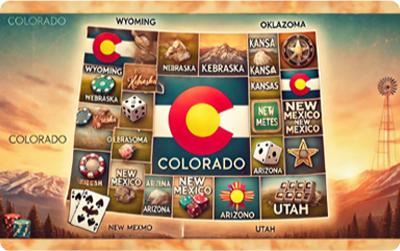Complete Guide to Colorado Online Casinos: Real Money Online Casinos, Legal Insights and Top Bonuses
Legal Status of Online Gambling in the US and Colorado
In Colorado, gambling activities are tightly regulated under specific laws and constitutional provisions, with stringent measures to prevent illegal gambling operations and promote responsible gambling practices. According to state law, gambling or helping someone else gamble for profit is generally illegal, but there are several exceptions: contests of skill, speed, strength, or endurance where awards are made only to participants or owners; social gambling among natural persons with no professional gambling involved, the Colorado lottery, certain bingo games, raffles, and charitable games, licensed casino gaming in accordance with state law, licensed in-person or online/mobile sports betting in accordance with state law.
These exceptions allow for specific types of gambling under regulated conditions, particularly focusing on licensed casino gaming and sports betting.
Internet gambling is not entirely legal. While the state has legalized certain forms of gambling, including licensed casino gaming and sports betting, it does not currently authorize online casino games or poker.
Online sports betting, however, is legal and regulated. Since 2020, Colorado has allowed licensed operators to offer online and mobile sports betting, which has been a significant step forward for the state’s gaming industry. Players can place bets on sports events through approved platforms and apps within the state’s borders
Here’s a breakdown of what is legal and the regulations surrounding gambling in the state:

Legal Gambling Forms:
- Colorado Lottery: Operated by the state, offering various lottery games.
- Betting on Horse Racing: The Colorado Division of Racing permits both live and off-track betting on horse races.
- Bingo, Raffles, and Charitable Games are regulated by the Secretary of State’s Office and require proper licensing.
- Social Gambling is legal under certain conditions where no profit is made from the operation of the game, and it occurs within a genuine social relationship among participants.
Casino Gaming
Casino games are restricted to the commercial districts of Black Hawk, Central City, and Cripple Creek. The games allowed are mainly slot machines, blackjack, poker, roulette, and craps, which must be conducted in buildings that conform to specific architectural styles reflective of the area’s historical character.
Prohibited Practices:
- It is illegal to engage in “silver mining,” which is the act of looking for and using coins or credits left behind in casino games.
- Playing off credits left on slot machines by previous players can lead to accusations of fraudulent acts under state gaming laws.
Colorado Gambling Legalization Timeline
1948
Pari-mutuel betting on horse and greyhound racing was legalized. This was the first significant legislative change towards legal gambling, creating the Colorado Racing Commission to oversee the operations.
1982
The Colorado Lottery was established following the approval of the Colorado Lottery Act. The first games were introduced in 1983, initially offering scratch-off tickets before expanding to include number drawings and multi-state lotteries like Mega Millions and Powerball.
1990
Colorado voters passed the Limited Gaming Act, legalizing limited-stakes casino gambling in the historic mining towns of Black Hawk, Central City, and Cripple Creek. The act allowed slot machines, blackjack, and poker, with a maximum bet of $5. This limit was later increased to $100 in 2009, and additional games like craps and roulette were permitted.
2002
Colorado approved the sale of multi-state lottery tickets, allowing residents to participate in larger, interstate lottery games.
2009
Voters approved Amendment 50, which raised the maximum bet limit to $100 and allowed casinos to offer additional games, including craps and roulette.
2014
Colorado banned greyhound racing, ending a long-standing form of gambling in the state.
2016
Daily Fantasy Sports (DFS) were legalized, with Colorado becoming the fifth state to officially legalize DFS operations, welcoming major operators like DraftKings and FanDuel.
2019
Proposition DD was approved by voters, legalizing sports betting in Colorado. The law allows both in-person and online sports betting, with the first legal bets being placed in May 2020. This marked a significant expansion in the state’s gambling industry.
2020
The first online and mobile sports betting operations launched on May 1st, with major operators like FanDuel, DraftKings, BetMGM, and BetRivers entering the market.
2022
Colorado voters passed a measure (Amendment 77) allowing local municipalities to raise the maximum single bet limits in casinos, further enhancing the gaming experience and contributing to the growth of the gambling industry in the state.
2023
Governor Jared Polis signed a new law addressing “gray casinos” or illegal gambling operations in the state. This legislation gave the Colorado Division of Gaming the authority to investigate and regulate these unlicensed establishments, enhancing the integrity of the state’s legal gambling market. A bill allowing casinos to offer lines of credit was passed but vetoed by the governor. This proposal might be reconsidered in future legislative sessions. Additionally, regulations on sports betting exchanges and updates to fantasy sports regulations are under review. Both the Ute Mountain Ute Tribe and the Southern Ute Indian Tribe have expressed interest in being included in the state’s online/mobile sports betting legislation through a voter referendum.
2024
Continued regulation and updates in the gambling sector, particularly concerning the monitoring and management of illegal gambling operations and refining the existing legal framework to adapt to new gambling formats and technologies.
Regulations and Oversight, Regulatory Bodies
Gambling in Colorado is regulated by the Colorado Limited Gaming Control Commission (CLGCC) and the Colorado Division of Gaming (CDOG). The CLGCC oversees licensing, rulemaking, and disciplinary matters, while CDOG handles investigations, license applications, and the day-to-day regulation and oversight of gambling, sports betting, and fantasy sports.
In Colorado, gambling activities are primarily governed by Article XVIII, § 9 of the Colorado Constitution and the Colorado Limited Gaming Act (C.R.S. § 44-1-101 et seq.). This framework became effective in 1990 following a voter referendum, initially allowing casino operations in Black Hawk, Central City, and Cripple Creek. The legislation has undergone several amendments, including those in 2019 to authorize in-person and online sports betting, and in 2021 to remove the $100 maximum bet limit at casinos.

Additionally, the Ute Mountain Ute Tribe and the Southern Ute Indian Tribe operate gaming activities under compacts with the state of Colorado in accordance with the federal Indian Gaming Regulatory Act.
Licenses are available for both casino gaming and sports betting, and there is no specific limit on the number of licenses issued. However, an individual cannot own more than three retail gaming licenses. Licenses are valid for two years and require renewal.
Operators must comply with federal and state AML laws, with their internal controls and procedures reviewed by CDOG. Suspicious or illegal wagering activity must be promptly reported.
Licensees are required to implement responsible gambling programs, which include self-exclusion lists, marketing opt-outs, and account limits. They must also submit annual reports and strategies to CDOG for promoting responsible gambling.
Types of licenses include:
- Retail Gaming License: For operating casinos.
- Operator License: For entities managing slot machines on their premises.
- Slot Machine Manufacturer or Distributor License: For those providing gaming equipment.
- Master Sports Betting License: For retail gaming licensees to operate sports betting directly or through third-party agreements.
- Vendor Major and Minor Licenses: For entities managing or providing significant products/services to sports betting operations.
Gambling Laws in Neighboring States

Colorado is bordered by seven states: Wyoming to the north, Nebraska to the northeast, Kansas to the east, Oklahoma to the southeast, New Mexico to the south, Utah to the west, Arizona to the southwest, at the Four Corners Monument, where Colorado, New Mexico, Arizona, and Utah meet. These borders make Colorado a centrally located state in the western United States.
If you’d like more gambling options than what is currently available in Colorado, any of the neighboring states will suffice, except Utah, which strictly prohibits all forms of gambling, including casinos, lotteries, sports betting, and online gambling, largely due to the strong influence of The Church of Jesus Christ of Latter-day Saints (LDS Church). This comprehensive ban is enshrined in the state constitution and upheld by strict state laws.
Wyoming:
Gambling in Wyoming is relatively limited. The state allows for charitable gaming, horse racing, and tribal gaming. The state recently legalized online sports betting, making it one of the few states with such regulations in place.
Nebraska:
Nebraska has traditionally had strict gambling laws, but recent changes have seen the legalization of casino gambling at racetracks. This was approved by voters in 2020. The state also permits charitable gaming and lotteries, but online gambling remains illegal.
Kansas:
Kansas offers a variety of gambling options, including state-operated casinos, parimutuel betting, and a state lottery. The state also recently legalized sports betting, which can be conducted both in-person and online.
Oklahoma:
Oklahoma is known for its numerous tribal casinos, which operate under compacts with the state. The state also permits parimutuel betting and a state lottery. Online gambling is not legal in Oklahoma, but there is a push to expand sports betting laws.
New Mexico:
New Mexico has tribal casinos, parimutuel betting, and a state lottery. The state also allows for sports betting at tribal casinos under existing gaming compacts. Online casino gambling is not permitted in New Mexico.
Utah:
Utah has some of the strictest gambling laws in the country, with nearly all forms of gambling being illegal. There are no state lotteries, casinos, or parimutuel betting allowed in Utah, reflecting the state’s strong stance against gambling.
Arizona:
Arizona has a well-established gambling market with tribal casinos, a state lottery, and parimutuel betting. Recently, Arizona legalized sports betting, allowing both in-person and online wagers. This has significantly expanded the gambling options available in the state.
Playing Real Money Online Casinos in Colorado
If you want to play real money online casinos in Colorado, you’ll have to look for options other than traditional online casinos. Land-based casino floors offer a variety of classic games, and sweepstakes are legal and a pretty solid alternative, as well as betting on sports and daily fantasy sports.
Many players insist on online play and in that case, your only alternative are offshore casinos.
| Type of Gambling |
Legal Status |
Details |
| Online Sports Betting |
Legal |
Regulated by the Colorado Division of Gaming. Licensed operators include DraftKings, FanDuel, and BetMGM. |
| Online Casino Games |
Illegal |
Online casino games are not currently regulated or permitted in Colorado. |
| Land-Based Casinos |
legal |
Located in Black Hawk, Central City, and Cripple Creek. Offers slot machines, table games, and poker. |
| Lottery |
Legal |
Operated by the Colorado Lottery. Includes Powerball, Mega Millions, and local draw games. |
| Social Casinos |
Legal |
Use virtual currencies or “sweepstakes” to participate. Examples include Chumba Casino and LuckyLand. |
| Sweepstakes Casinos |
Legal |
Legal under sweepstakes laws. Use sweepstakes entries to offer casino-like games. |
| Offshore Online Gambling |
Illegal |
Wagering with unlicensed operators outside U.S. jurisdiction is not legally protected in Colorado. |
| Charitable Gaming |
Legal |
Includes bingo and raffles, regulated under state charity laws. |
Legal Online Gambling Options in Colorado
- Online Sports Betting: Colorado has legalized online sports betting. You can place bets on various sports through licensed operators. Some popular sportsbooks include DraftKings, FanDuel, BetMGM, and BetRivers.
- Sweepstakes Casinos: Since traditional online casino gaming (like slots and table games) is not yet legal in Colorado, you can participate in sweepstakes casinos. These platforms, like Chumba Casino and LuckyLand Slots, operate legally by offering sweepstakes-style promotions. Players can purchase virtual currency and have the chance to win real cash prizes through sweepstakes entries.

Nearby States with Online Casino Options
If you’re willing to travel, neighboring states such as Nevada and New Jersey offer more extensive real-money online casino options.
- Nevada has an extensive gambling industry and offers a range of online poker and mobile sports betting options.
- New Jersey is the most welcoming to online gambling of all US states, having legalized online gambling in 2913, and currently allows residents and visitors to play online slots, table games, and poker at a wide variety of licensed online operators.
Offshore Online Casinos
While offshore online casinos might seem like an appealing option for playing real money games if you reside in Colorado, there are significant risks involved. These casinos are not regulated by U.S. authorities, meaning there is less consumer protection and potential issues with security, fairness, and the legality of transactions. It is generally safer and more advisable to use regulated and licensed operators within the U.S., however, there are plenty of reputable offshore casinos that have been in the business for years without issues and welcomed many satisfied US players.
If you decide to use offshore online casinos while residing in Colorado, it’s important to take several precautions:

- Research the Casino’s Reputation: Ensure the offshore casino has a good reputation, is well-reviewed, and has been operating for a significant period.
- Check Licensing and Regulation: Look for casinos licensed by reputable jurisdictions such as Malta, Gibraltar, or Curacao. These licensing bodies are established and reputable within iGaming despite being outside the USA. Operators with their licenses must meet requirements like player protection, fair gaming, RNG-approved games, responsible gambling guidelines, and AML.
- Understand the Legal Risks: Be aware that using offshore casinos is technically against U.S. law, and while enforcement is rare, it remains a risk.
- Ensure Secure Transactions: Use secure payment methods like e-wallets or cryptocurrencies to protect your financial information.
- Read Terms and Conditions: Carefully read the casino’s terms, especially regarding withdrawals, bonuses, and dispute resolution.
- Customer Support: Make sure the casino offers robust customer support in case you encounter issues.
Top Real Money Online Casino Games in Colorado
While traditional online casino games like slots and table games are not yet legally available in Colorado, residents have access to various legal online gambling options that include sports betting and sweepstakes casinos.
1. Online Sports Betting
Online sports betting is fully legal and operational in Colorado. The state legalized it through a voter referendum in 2019, and it has been live since May 2020. Top legally licensed platforms to bet on a wide array of sports, including the NFL, NBA, and MLB, include DraftKings Sportsbook, FanDuel Sportsbook, BetMGM, and BetRivers.
2. Sweepstakes Casinos
These casinos operate legally by offering sweepstakes-style games. Players can purchase virtual currency and enter sweepstakes to win real cash prizes on slot games and table games slot games and table games.


3. Offshore Online Casinos
Some players in Colorado choose to play at offshore online casinos, which are not regulated by US laws but offer a wide range of casino games including slots, table games, and live dealer options. However, it’s important to consider the potential risks involved with using offshore sites, including issues related to security, fairness, and the legality of winnings.
4. Slots
Betsoft, Realtime Gaming (RTG), and Rival Gaming are among the best-known slot providers at US-facing offshore sites.
Slots are the most popular games, offering a variety of themes, bonuses, and progressive jackpots. Betsoft is known for its high-quality 3D graphics, RTG for its wide selection and progressive jackpots, and Rival Gaming for its unique interactive slots (i-Slots).
5. Table Games
Microgaming, Evolution Gaming, and Visionary iGaming provide US favorites table games like blackjack, roulette, baccarat, and craps. Microgaming provides a wide array of classic table games, while Evolution Gaming is renowned for its live dealer options. Visionary iGaming also offers engaging live dealer experiences.
6. Poker
Online poker is a staple, with various cash games and tournaments available. Ignition Poker and Bovada are known for their recreational player pools.


7. Video Poker
Video poker games like Jacks or Better, Deuces Wild, and Joker Poker are widely enjoyed. Among others, Betsoft and RTG provide multiple variants with different paytables and gameplay styles, and Microgaming offers high RTP video poker options.
8. Live Dealer
Live dealer games, such as blackjack, roulette, baccarat, and poker variations, are popular in US offshore online casinos. These games provide a realistic and immersive experience, simulating the atmosphere of a physical casino with real-time interaction with dealers. This format appeals to many players seeking an authentic casino experience from the comfort of their homes.
9. Specialty Games
Specialty games include keno, bingo, scratch cards, and virtual sports. Rival Gaming and RTG offer a variety of these games to cater to different player interests.
Best Colorado Online Casino Bonuses in 2024
In Colorado, players have access to a variety of bonuses, both from legal online sports betting sites and offshore casino platforms. Each of these bonuses can enhance your gaming experience by providing extra funds, reducing losses, and offering opportunities to win prizes through competitions.
When it comes to promotional offers at offshore casinos, you will find all types of bonuses that may include incentives for new and existing players, loyalty rewards for active depositors, new game promotions, free spins, cashback and reload deals weekly or monthly, and holiday promotions. Many operators will also utilize emails, SMS, and social media to offer giveaways, limited-time bonuses, or any other way to give back to players.
Always read the terms and conditions associated with each bonus to understand the wagering requirements and any restrictions that may apply.
Let’s see what kind of casino bonuses are usually available for Colorado players:
Welcome Offers
This is by far the most common and frequent type of bonus, tailored specifically for newcomers who can start with a larger bankroll and extend gameplay time with less money involved.
- Deposit Match Bonuses: These bonuses match a percentage of your initial deposits, providing you with extra funds to play with. They are a standard feature in welcome packages, often spread across the first few deposits.
- No-Deposit Bonuses: These are offered to new players upon registration without requiring an initial deposit, allowing players to explore the casino and potentially win real money. They are not so common but very popular with US players overall.
Cashback
This is an excellent bonus type with perhaps the most profitable quality among casino offers. The bottom line is that you are guaranteed a part of your lost wagers back during a specified time frame. The best thing about cashback is that the wagering requirements are usually very low (around 5x), although the cashout limit and the loss percentage you can get back are not so high.
- Cashback Bonuses: Players receive a percentage of their losses back over a specific period. This bonus is typically calculated daily or weekly, helping to soften the blow of unlucky streaks.
Loyalty Rewards
More popular than ever, loyalty/reward programs and VIP schemes have become a staple of any aspiring casino. Thanks to a variety of rewards that don’t always come down to bonuses, players recognize they are appreciated. You can expect personalized service, priority support, and even faster payouts with higher cashout limits.
- VIP Programs: Regular players can earn points for every wager, which can be redeemed for various rewards. VIP programs often have multiple levels, with each tier offering better rewards such as higher point conversion rates, exclusive bonuses, and personalized services.
- Tiered Rewards: These programs reward players with increasing benefits as they move up through different loyalty levels based on their gameplay activity. These programs are usually based on complimentary points.

Tournaments
Some casinos offer tourneys from time to time, others make it a regular, ongoing event spanning select games and featuring worthy prizes for players who make it to the top of the leaderboard.
- Slot Tournaments: These competitive events allow players to compete against each other to achieve the highest scores on designated slot games. Winners can earn cash prizes, free spins, or other rewards.
- Table Game Tournaments: Similar to slot tournaments, these competitions focus on table games like blackjack or poker, offering prizes to the top performers.

Special Promotions
The sky is the limit when it comes to the kind of promotion casinos may create. Special offers are different from the typical casino incentive.
- Cryptocurrency Bonuses: Some platforms offer additional bonuses for deposits made using cryptocurrencies like Bitcoin, providing an extra incentive for using alternative payment methods.
- High-Payout Tournaments: These events often feature larger prize pools and attract a wide range of participants, providing an exciting competitive edge to the gaming experience.
Regular Bonuses
Below are the most common types which are usually offered weekly or monthly to depositors. Even free spins will likely require at least one deposit in the past and will come with wagering requirements attached.
- Reload Bonuses: Offered to existing players to encourage additional deposits, these bonuses typically match a percentage of the deposit amount.
- Free Spins: Awarded on specific slot games, free spins give players the chance to win real money without risking their own funds.
No Wagering Bonuses
Don’t get your hopes up too much for this one – they are quite rare but still pop up from time to time. Some casinos may even build their entire marketing strategy around the no-wagering bonuses.
- Wager-Free Bonuses: These bonuses allow players to withdraw their winnings without having to meet wagering requirements, making them highly attractive.

Deposit and Withdrawal Methods at Colorado Online Casinos
When it comes to deposit and withdrawal methods at Colorado online casinos, your options will differ depending on the casino itself. Locally licensed casinos will have different, usually less varied options to fund your account and cashout winnings, while offshore casinos are more likely to support a greater selection of alternative methods like e-wallets, reloadable prepaid cards or crypto.
Deposit Methods
Colorado players will usually find the following deposit options at online casinos:
Credit and Debit Cards
Visa and MasterCard are globally known and accepted and widely available for deposits, offering a straightforward way to fund your account instantly.
American Express is not as common but can still be found at offshore casinos exclusively targeting US players.
E-Wallets
PayPal is a popular e-wallet option known for its security and ease of use, and along with Skrill and Neteller, provides quick and secure transactions.
Bank Transfers
Bank transfer is the most common method in US-facing casinos, especially those offshore.
ACH (eCheck): This is a direct transfer from your bank account to the casino, often used for both deposits and withdrawals.
Wire Transfer: Another method for moving funds directly between your bank and the casino, though it may take a bit longer.
Prepaid Cards
Players like various prepaid cards due to ease of use, anonymity and safety. There are many prepaid card providers available in the US.
Play+ Card: A prepaid card that can be funded via various methods and used for both deposits and withdrawals.
Cryptocurrencies
An increasing number of casinos around the world accept cryptocurrencies like Bitcoin, Litecoin, Dogecoin, Ethereum and other coins for deposits, offering a modern alternative with potentially lower fees. Crypto is particularly useful in gambling due to various legal issues and restrictions players regularly face with traditional payment service providers who block fiat currency transactions to and from online casinos.
Casino Cage Deposits
Players can visit the physical casino affiliated with the online platform to deposit cash directly at the casino cage. This is available only for locally licensed casinos and gambling enterprises offering land-based gambling across Colorado and other US states.
Withdrawal Methods
You’ll find that the cashout options are fewer for US players at offshore casinos due to strict regulations and the UIGEA prohibiting financial gambling transactions.
Here are some withdrawal methods you can expect at online casinos:
1. E-Wallets
- PayPal, Skrill, and Neteller: Fast and secure methods for withdrawing your winnings, often processed within 24 hours.
2. Bank Transfers
- ACH (eCheck): A common method for withdrawing funds directly to your bank account.
- Wire Transfer: Suitable for larger withdrawals but may take several business days.
3. Play+ Card
- Withdrawals to a Play+ Card are typically processed quickly and can be used at ATMs or transferred to your bank account.
4. Check by Mail
- Some casinos offer the option to receive a physical check, though this method takes the longest to process and deliver.
5. Cryptocurrencies
- For casinos that accept crypto deposits, withdrawals can also be made in cryptocurrencies, providing a fast and secure option.
6. Casino Cage Withdrawals
- Similar to deposits, players can withdraw their winnings in cash at the physical casino cage associated with the online platform.
- Processing Times: Withdrawal times can vary depending on the method chosen. E-wallets and Play+ Cards generally offer the fastest processing times, while bank transfers and checks by mail can take longer.
- Fees: Be aware of any fees associated with different deposit and withdrawal methods. E-wallets and cryptocurrencies often have lower fees compared to bank transfers and checks.
- Verification: Casinos may require identity verification before processing withdrawals to comply with legal and security regulations.
Where to Gamble for Real Money in Colorado
Colorado offers a diverse range of gambling options, from licensed land-based casinos to regulated online sports betting platforms. Additionally, many residents also turn to offshore online casinos to enjoy a variety of casino games. Here is an overview of the different gambling options available in Colorado:
Licensed Gambling
Currently, Colorado does not have legal online casino gambling. However, residents can legally participate in other forms of online gambling:
- Online Sports Betting: Colorado legalized sports betting in May 2020, allowing residents to place bets on a variety of sports through licensed online platforms and mobile apps. Major operators in the state include DraftKings, FanDuel, BetMGM, and Caesars. These platforms offer betting on a wide range of sports, including professional and collegiate games, providing a legal and regulated way to engage in online sports betting.
- Online Lottery: The Colorado Lottery offers an online option for purchasing tickets for games such as Powerball, Mega Millions, and local draw games. This allows residents to participate in the lottery conveniently from their own homes.

Land-Based Casinos
Colorado’s land-based casino industry is robust, with several well-known casino towns and tribal casinos offering a variety of gambling options.
- Casinos in Black Hawk, Central City, and Cripple Creek: These towns are the hubs of Colorado’s casino industry, home to over 30 casinos that provide a wide array of gaming options. Popular casinos in these areas include Ameristar, Isle Casino, and Monarch Casino Resort Spa. Gamblers can enjoy a variety of table games like blackjack, poker, craps, and roulette, as well as numerous slot machines and poker rooms.
- Tribal Casinos: Colorado is also home to tribal casinos operated by the Ute Mountain Ute Tribe and the Southern Ute Indian Tribe. The Ute Mountain Casino & Hotel in Towaoc offers slots, table games, and bingo, while the Sky Ute Casino Resort in Ignacio features a similar array of gaming options, including a sportsbook.
Offshore Online Casinos
Due to the absence of legal online casino gambling within the state, many Colorado residents turn to offshore online casinos to play their favorite games. These casinos are not regulated by US authorities but offer a wide range of gaming options and substantial bonuses. It’s important to choose reputable platforms to ensure fair play and secure transactions.
Offshore online casinos offer a broad spectrum of games, including slots, table games, video poker, and live dealer games. Popular game categories include:
- Slots: These come in various themes and offer classic and modern games, as well as different types of jackpots.
- Table Games: Classics such as blackjack, roulette, baccarat, and poker.

- Live Dealer Games: These provide a real-time gaming experience with live dealers for games like blackjack and roulette.
Offshore casinos often attract players with substantial bonuses, including welcome bonuses, no-deposit bonuses, cashback offers, and loyalty rewards. These bonuses provide added value and enhance the gaming experience.
A variety of payment methods is supported, including cryptocurrencies like Bitcoin and Litecoin, which offer fast and secure transactions. Other common methods include credit cards, e-wallets, and bank transfers.
Essential Tips for Online Gambling in Colorado
Online gambling can be an exciting and rewarding experience, but it’s crucial to approach it wisely to maximize enjoyment and minimize risks. Online gambling in Colorado offers a variety of options, especially with legal sports betting platforms. By following these tips, you can enjoy a safer and more enjoyable gambling experience, whether you are betting on sports or playing casino games through offshore sites. Always prioritize responsible gambling practices to ensure that your gaming remains a fun and controlled activity. Here are some essential tips tailored for gamblers in Colorado and the broader US:

1. Choose Licensed and Reputable Sites
- Offshore Casinos: If opting for offshore online casinos, research their reputation. Look for user reviews, licensing information, and third-party audits to confirm their credibility.
- Licensed Operators:Ensure that you are gambling on platforms licensed by the Colorado Division of Gaming for sports betting or other state-regulated entities. This ensures that the site operates within legal frameworks and adheres to fair play standards.
2. Understand the Legal Landscape
- State Regulations: Be aware of what is legally permitted in Colorado. Online sports betting and the state lottery are legal, but online casinogames are not. Engaging with offshore sites for casino games may not be explicitly illegal but operates in a legal gray area.
- Stay Updated: Laws and regulations can change. Stay informed about any new legislation that might impact your gambling activities.
3. Manage Your Bankroll Wisely
- Set a Budget: Determine a gambling budget that you can afford to lose. Stick to this budget to prevent financial stress.
- Deposit Limits: Use tools offered by many online platforms to set deposit limits. This helps control spending and avoid the temptation to chase losses.
4. Utilize Bonuses and Promotions
- Welcome Bonuses: Take advantage of welcome bonuses offered by both state-licensed sports betting platforms and offshore casinos. Read the terms and conditions to understand wagering requirements and other restrictions.
- Loyalty Programs: Participate in loyalty programs to gain rewards for your play. These can include cashback offers, free spins, and other incentives that enhance your gambling experience.
5. Prioritize Security
- Secure Payment Methods: Use trusted payment methods such as credit cards, e-wallets, or cryptocurrencies for deposits and withdrawals. Ensure the site uses encryption to protect your financial information.
- Personal Data: Protect your personal information by using strong, unique passwords and enabling two-factor authentication if available.
6. Stay Informed About Game Rules, Odds and Strategies
- Learn the Games: Understand the rules and odds of the games you are playing. Knowledge of game strategies can significantly increase your chances of winning.
- Sports Betting: Research teams, players, and sports statistics to make informed bets. Utilize betting tools and analytics provided by sportsbooks to guide your decisions.
7. Practice Responsible Gambling
- Self-Exclusion: If you feel that your gambling is becoming problematic, use self-exclusion tools offered by gambling platforms. These tools can block your access to gambling sites for a specified period.
- Seek Help: Don’t hesitate to seek help if you think you are developing a gambling problem. Organizations like the National Council on Problem Gambling offer resources and support for individuals struggling with gambling addiction.
8. Keep Track of Your Activities
- Record Keeping: Maintain a record of your gambling activities, including wins, losses, and time spent gambling. This can help you stay within your limits and recognize patterns in your behavior.
Pros and Cons of Online Gambling in Colorado
As with any other region, gambling on the internet in Colorado has its advantages and disadvantages compared to the regulated land-based options. Being much more readily available is one major advantage many players value above others in this increasingly busy modern lifestyle where we are always pressed for time.
Others may argue that having many more games and genres beats all other convenient aspects of casino floors.
Pros
- Readily available: Online gambling in Colorado offers unparalleled convenience. Players can access licensed sites from anywhere within the state, eliminating the need to travel to land-based casinos in Black Hawk, Central City, or Cripple Creek. This flexibility allows for gambling at any time, making it easy to fit into a busy lifestyle.
- Greater selection of sports betting and casino games: Licensed online platforms in Colorado provide a broad range of betting options. Sports bettors can wager on major leagues, college sports, and various events with numerous markets. Online casinos offer an extensive selection of games, including slots, table games, and live dealer options.
- Online-only bonuses: Licensed online casinos and sportsbooks often offer generous promotions, such as sign-up bonuses, free bets, and ongoing promotions. These can significantly enhance the value of your gambling experience and provide extra funds for betting or gaming.
- Locally licensed sites are regulated and safe:Gambling on licensed platforms ensures adherence to state regulations and standards. This includes responsible gambling measures, secure transactions, and fair gaming practices. Licensed sites in Colorado are monitored by the Division of Gaming, which provides a layer of consumer protection.
- Responsible Gaming Tools: Licensed platforms provide tools to manage gambling behavior, including deposit limits, self-exclusion options, and access to support resources. This helps in maintaining a healthy approach to gambling.
Cons
- State Taxes on Winnings: Winnings from licensed Colorado online gambling platforms are subject to state taxes. This means that bettors must report their gambling earnings and pay applicable taxes, which can reduce the overall amount of winnings.
- Limited Game Selection: While Colorado’s licensed platforms offer a wide range of options, they might not have as extensive a selection as some offshore casinos. Certain unique or specialized games may only be available on international sites.
- Offshore Risks: Engaging with offshore gambling sites introduces several risks. These platforms are not regulated by Colorado law, so players lack the same protections as with licensed sites. Issues such as disputes over payouts or unfair gaming practices can be more challenging to resolve.
- Legal Uncertainty:While offshore sites are not explicitly illegal, they operate in a legal gray area. This can create complications if players encounter problems with these platforms, as there’s less recourse for resolving issues compared to dealing with licensed operators.
- Complicated Tax Reporting:Winnings from offshore sites must still be reported for U.S. tax purposes, which can complicate tax filings. Players might face additional challenges in ensuring accurate reporting and compliance with tax laws.
Sweepstakes and Social Casinos in Colorado
Sweepstakes casinos and social casinos offer distinct gaming experiences in Colorado.
Sweepstakes casinos operate under a model that can legally include some degree of chance-based entry for prizes, but they do not directly involve real money betting or withdrawals.
Social casinos, on the other hand, focus on providing a virtual casino experience with in-game currency, with no real-money gambling or winnings involved. Both types of platforms cater to different aspects of online entertainment but do not provide the same opportunities for real-money gambling as traditional online casinos or sportsbooks.
Sweepstakes Casinos: Sweepstakes casinos are a unique form of online gambling where players participate in sweepstakes promotions rather than traditional gambling. These platforms operate using a sweepstakes model, where players can enter to win cash or prizes through a combination of skill-based and chance-based activities.
Social Casinos: Social casinos are online platforms where players can enjoy casino-style games such as slots, poker, and table games. Unlike traditional online casinos, social casinos are often free-to-play but may offer in-game purchases for virtual currency or tokens. These platforms are designed to mimic the casino experience without the direct use of real money for bets or winnings.
Legal Status in Colorado
Sweepstakes Casinos: In Colorado, sweepstakes casinos operate in a somewhat legal gray area. They are not explicitly regulated by state gambling laws but are allowed to operate under the sweepstakes model, which is different from traditional gambling. Sweepstakes casinos are considered legal if they adhere to certain guidelines, such as not requiring a purchase to enter the sweepstakes and providing a free entry method.
Social Casinos: Social casinos are legal in Colorado as they do not involve real money gambling. They operate under the premise of providing entertainment and social interaction rather than actual gambling. These platforms are not regulated under Colorado’s gambling laws because they do not offer real-money betting or winnings. They are considered a form of online entertainment rather than gambling.

How Sweepstakes Casinos Work:
Entry and Participation: Players typically purchase virtual goods or tokens to enter sweepstakes or participate in promotional offers. Some sweepstakes casinos also offer free entries to comply with legal requirements.
Winnings: Prizes can be won through sweepstakes entries, and these prizes may include cash or other rewards. Winnings are generally issued in the form of prizes rather than direct cash payouts. Players may receive physical prizes or virtual rewards that can be exchanged for merchandise or other items.
Real Money Use: Sweepstakes casinos do not typically allow for direct betting with real money. However, players may spend money on virtual goods or tokens to participate in the sweepstakes.
How Social Casinos Work:
Gameplay: Players use virtual currency or tokens to play casino-style games. These games simulate the experience of real-money gambling but do not involve actual cash wagers.
Virtual Currency: Social casinos offer virtual currency that can be purchased with real money. This currency is used to play games and participate in promotions. It cannot be withdrawn or exchanged for real money.
Winnings: Any “winnings” in social casinos are purely virtual and cannot be cashed out. The primary goal is entertainment and social interaction, not real-money gambling.
Future of Online Gambling in Colorado
The future of online gambling in Colorado appears promising, given the state’s evolving regulatory landscape and broader trends in the U.S. gambling industry. While there are challenges, including increased competition and the need for effective regulation, Colorado has the potential to be a key player in the online gambling market. The state has a proactive approach to regulation and we can reasonably hope it will revamp the laws to be more online gambling-friendly in the coming years, namely regarding casinos and casino games.
Here’s an educated prediction based on recent developments and trends:

Growth of Online Sports Betting
The success of online sports betting in Colorado since its legalization in May 2020 is an excellent start for any future expansion. The high betting handle and significant state revenue indicate plenty of players are interested in internet betting. With major sporting events like the Super Bowl and the Olympics driving interest, Colorado can capitalize on economic growth including more betting options.
Tech Adoption
As technology advances, we can expect more sophisticated platforms to offer enhanced user experiences. Innovations such as AI-driven personalized betting recommendations, improved mobile interfaces, and faster transaction processes are likely to become standard.
Potential for Legalization of Additional Forms of Online Gambling
While Colorado currently has legal online sports betting and land-based casinos, there may be moves to expand into other gambling areas, such as online poker or more comprehensive casino games. As state regulators and lawmakers observe the success and challenges of existing online gambling operations, they may consider broadening the scope to include additional gambling formats, like New Jersey and other states that have benefited from regulating the market.
More Responsible Gambling Measures
With the rise in online gambling activity, there will likely be an increased focus on consumer protection and responsible gambling practices. Expect more stringent regulations and measures designed to prevent problem gambling, protect underage users, and ensure fair play. Colorado’s approach will likely serve as a model for other states, emphasizing player safety and responsible gaming.
Offshore, Land-Based Competition
The online gambling market in Colorado will face competition from both licensed operators and unregulated or offshore sites. As more states legalize and regulate online gambling, Colorado will need to remain competitive by offering attractive promotions, a wide range of games, and superior customer service. The state will also need to address challenges related to market saturation and ensure that its regulatory framework remains effective.
Trends in U.S. Online Gambling
2024 has seen some major developments across the United States regarding online gambling and sports betting regulation.
California has continued to debate the legalization of online casinos in July 2024. Recent legislative proposals aim to put online casino gambling on the ballot for 2024, following a series of failed attempts in previous years. The proposed framework includes regulatory oversight by the California Gambling Control Commission and strict consumer protection measures.
New York has seen significant expansion in its online sports betting market. Recent legislation has increased the number of mobile sports betting licenses available, allowing more operators to enter the market. This move aims to boost state revenue and enhance competition among sportsbooks.
Texas lawmakers are exploring the possibility of legalizing online sports betting. A new bill introduced in the state legislature proposes regulating online sports betting through a state lottery framework, with the potential to generate significant revenue for education and infrastructure projects.
Michigan has introduced new regulations to strengthen responsible gambling measures. These include mandatory self-exclusion programs and enhanced player protection features for both online and land-based casinos. The state aims to address growing concerns about gambling addiction.

Pennsylvania has enacted new regulations to restrict online gambling advertising. The regulations are designed to prevent misleading advertisements and ensure that marketing efforts do not target vulnerable populations. This move follows increased scrutiny over gambling promotions.
Illinois is reviewing its online gambling taxation policies to address concerns about revenue distribution and tax rates. Recent discussions focus on adjusting tax rates to optimize revenue while maintaining a competitive market for operators.
Florida is making ongoing efforts to legalize online sports betting. Recent legislative sessions have discussed potential frameworks and regulatory structures. The state faces legal and political challenges but remains committed to advancing its gambling regulations.
Ohio has introduced a new regulatory framework for online casinos, focusing on licensing, consumer protection, and responsible gambling. The new regulations are expected to create a structured and transparent environment for online casino operations.
Massachusetts has passed comprehensive legislation to regulate both fantasy sports and online gambling. The new laws include provisions for licensing, taxation, and responsible gambling practices, aiming to create a robust regulatory environment for both industries.
Continued State-by-State Legalization
The trend of states legalizing online gambling and sports betting is likely to continue. As more states join the market, competition will increase, and Colorado will need to adapt to maintain its position as a leading gambling destination.
Increased Focus on Apps
Mobile gambling is becoming the primary mode of engagement for many users. The increasing prevalence of smartphones and tablets means that online gambling platforms will need to prioritize app optimization and app development. Colorado’s operators will likely invest in mobile technology to enhance user experience and capture a larger share of the market.
Regulatory Trends and Federal Oversight
There may be shifts in federal oversight and regulation, especially regarding online gambling and sports betting. Federal regulations could impact how states like Colorado manage and oversee their gambling industries. Keeping an eye on federal legislative developments will be crucial for Colorado’s gambling market.
Growth of Emerging Gambling Formats
Innovations such as virtual sports, esports betting, and in-game betting are gaining popularity. Colorado may see an increase in these emerging formats as operators look to diversify their offerings and attract a broader audience.
Colorado Online Casinos FAQ
Is online sports betting legal in Colorado?
Yes, online sports betting was legalized in Colorado in 2020. Residents can place sports bets through licensed online sportsbooks regulated by the Colorado Division of Gaming.
Can I play online casino games in Colorado?
No, online casino games are not currently regulated or legal in Colorado. Efforts to legalize online casino gambling have been discussed but are not yet approved. You can play online casino games at offshore casinos, but those are not regulated by the state.
Are there any legal online poker sites in Colorado?
As of 2024, online poker is not regulated or authorized in Colorado. Poker enthusiasts can participate in live poker at licensed land-based casinos, but online options are not available.
What is the legal age for online gambling in Colorado?
The legal age for online sports betting in Colorado is 21 years old. This is in line with the state’s regulations for other forms of legal gambling.
How can I place a bet on sports online in Colorado?
You can place a sports bet online through licensed sportsbooks in Colorado. Popular platforms include DraftKings, FanDuel, and BetMGM, among others. These operators are regulated by the Colorado Division of Gaming.
Are there any restrictions on the types of sports bets I can place in Colorado?
No, Colorado offers a wide range of sports betting options. You can bet on major sports like football, basketball, and baseball, as well as niche sports, esports, and more.
Can I use cryptocurrency for online sports betting in Colorado?
While some sportsbooks in other states accept cryptocurrency, Colorado’s regulated sports betting market primarily supports traditional payment methods like credit cards, bank transfers, and e-wallets.
Are there any tax implications for gambling winnings in Colorado?
Yes, gambling winnings are subject to federal and state taxes. In Colorado, you must report gambling winnings as income, and it is advisable to keep detailed records for tax purposes.
What measures are in place to ensure responsible gambling in Colorado?
Colorado’s online sports betting operators are required to implement responsible gambling measures, including self-exclusion options, deposit limits, and access to gambling addiction resources.
Can I legally gamble on international sports events from Colorado?
Yes, you can place bets on international sports events through licensed Colorado sportsbooks. However, availability may vary based on the sportsbook’s offerings and the types of events they cover.
Sources

















